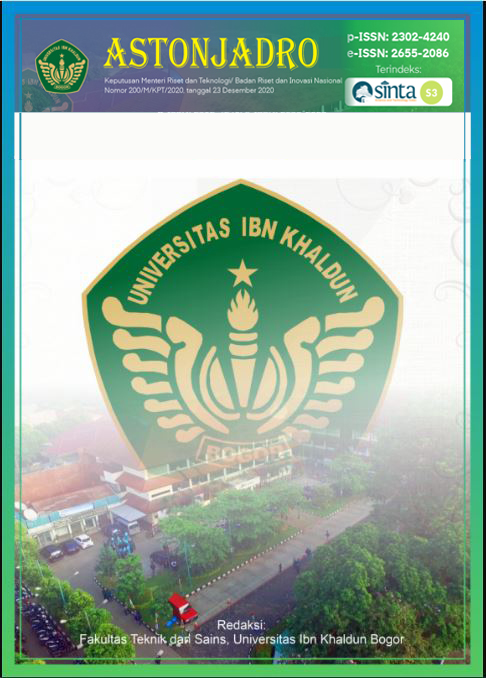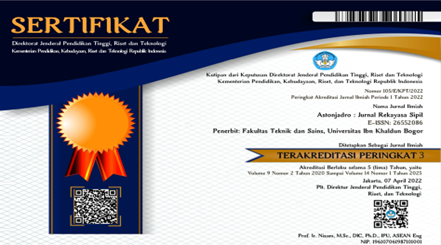Numerical Analysis of the Response of Existing Tunnel Structures to Crossing Tunnel Construction in Soft Soil
DOI:
https://doi.org/10.32832/astonjadro.v13i3.15858Keywords:
tunneling; back-analysis; FEA; soft clay; hardening soil.Abstract
Massive urban planning forces the utilization of underground space, not least in the development of transportation infrastructure. MRT Jakarta has successfully made its line in phase 1 Lebak Bulus - Bundaran HI and now is developing the line which is packaged in phase 2 to the direction of Ancol, this route reaches the south-north part of Jakarta. In recent years, there has also been a plan to add an East-West line which will be packed in phase 3, this does not rule out the possibility of a meeting between the existing tunnel and the undercrossing tunnel. This study discusses the influence of undercrossing on the existing tunnel structures, especially under Jakarta Clay, which is classified as having a thick, soft clay stratum. This research was divided into 2 steps using finite element analysis with Hardening Soil model. The first step is to conduct a back analysis to obtain the actual soil parameter value then proceed with step 2, which is to conduct an undercrossing twin tunnel analysis. Based on the results of the study showed the fittest soil parameters using the correlation E50 = 3500N by the effective soil strength parameters and the undercrossing excavation caused four stages of vertical displacement of the existing tunnel.
References
Chen, Ren-Peng. 2018. Deformation and Stress Characteristics of Existing Twin Tunnels Induced by Close-Distance EPBS Under-Crossing. Tunnelling and Underground Space Technology 82 : 468 – 481.
CUR. 2003. CUR Rapport 2003 : 7 Bepaling Geotechnische Parameters.
Hsiung, B-C B., Yang, K-H., Aila, W., Ge, L. 2018. Evaluation of the Wall Deflections of a Deep Excavation in Central Jakarta Using Three-Dimensional Modeling. Tunneling and Underground Space Technology : 72 (84-96).
Hsiung, B-C. 2009. A Case Study on the Behaviour of a Deep Excavation in Sand. Computers and Geotechnics: 36 (665-75).
Huynh, Q T., Lai, V Q., Boonyantee, T., Keawsawasvong, S. 2022. Verification of Soil Parameters of Hardening Soil Model with Small-Strain Stiffness for Deep Excavations in Medium Dense Sand in Ho Chi Minh City, Vietnam. Innovative Infrastructure Solutions : 7 (1-20).
Idriss, I.M., Boulanger, R.W. 2008. Soil Liquefaction during Earthquake. MNO.
Liu, Yinghin. 2022. Structural Responses of DOT Tunnel Induced by Shield Under Crossing in Close Proximity in Soft Ground. Tunnelling and Underground Space Technology 128 : 104623.
Look, Burt. 2014. Handbook of Geotechnical Investigation and Design Tables. CRC Press.
Ma, Shaokun., Li, Jinmei., Li, Zhuofeng. 2022. Critical Support Pressure of Shield Tunnel Face in Soft-Hard Mixed Strata. Transportation GeotechnicsL 37 (100853).
Mohammed, Jaafar A. 2017. Numerical Modelling for Circle Tunnel under Static and Dynamic Loads for Different Depth. Research Journal of Mining: 1 (1-11).
Peng, Fang-Le et al., 2021. A Collaborative Approach for Urban Underground Space Development toward Sustainable Development Goals: Critical Dimensions and Future Directions. Front Struct Civ Eng 15 (1): 20 – 45.
Ren, Ting., Zhang, Hailong., Guo, Yuancheng., Tang, Yang., Li, Qinglin. 2022. Numerical Simulation of Ground Surface Settlement of Underpass Building in Tunnel Boring Machine Double – Line Tunnels. Front Eart Sci. Sec Geoscience and Society. Vol 10-2022.
Tazakka., Tirta, Budiwan Adi. 2023. Direct Field Curve Fitting Method to Determine Hardening Soil Parameter for Geotechnical Projects. Proceeding Journal of Physics: Conference Series.
Yang, Yi., Li, Xinggao., Jin, Dalong., Li, Hanyuan. 2022. Prediction of Ground Surface Settlements Induced by EPB Shield Tunneling in Water-Rich Soft Strata. Applied Science 12: 4665.
Zang, Yanwei. 2019. Effects of Construction Sequences and Volume Loss on Perpendicularly Crossing Tunnels. Advances in Civil Engineering, Hindawi.
Downloads
Published
How to Cite
Issue
Section
License
Copyright (c) 2024 ASTONJADRO

This work is licensed under a Creative Commons Attribution-ShareAlike 4.0 International License.
Paper submitted to ASTONJADRO is the sole property of the Astonjadro Journal. Unless the author withdraws the paper because he does not want to be published in this journal. The publication rights are in the journal Astonjadro.ASTONJADRO
LICENSE
This work is licensed under a Creative Commons Attribution-ShareAlike 4.0 International License.
Based on a work at http://ejournal.uika-bogor.ac.id/index.php/ASTONJADRO













